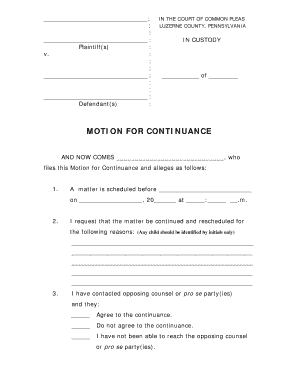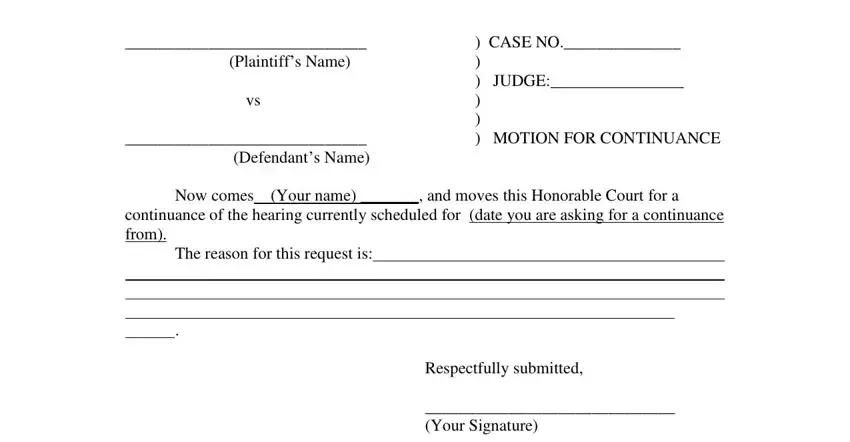The Motion for Continuance Template That Works: A Guide to Postponing Your Court Date
Facing a court date can be stressful. Sometimes, circumstances arise that make it impossible or highly impractical to proceed as scheduled. That’s where a motion for continuance comes in – a formal request to the court to postpone your hearing or trial. Understanding how to draft a compelling motion for continuance is crucial for ensuring your rights are protected and you have the time you need. This article provides a comprehensive guide and a practical template to help you navigate this often-necessary legal process.
What is a Motion for Continuance?
A motion for continuance is a formal legal document submitted to the court, requesting a postponement of a scheduled hearing, trial, or other court proceeding. It’s a critical tool for litigants who, for legitimate reasons, cannot proceed as planned. Success hinges on providing a valid reason and adhering to the court’s specific rules.
Why You Might Need a Motion for Continuance
There are numerous valid reasons for requesting a continuance. Here are some common scenarios:
- Unavailability of Key Witnesses: A critical witness is unavailable due to illness, travel, or other unforeseen circumstances.
- Illness or Injury: You, the defendant, or a key member of your legal team is medically incapacitated.
- Need for Additional Time for Discovery: More time is required to gather evidence, depose witnesses, or conduct investigations.
- Incomplete Case Preparation: Your attorney or you need more time to prepare your case effectively.
- Conflict of Interest: A conflict of interest arises, requiring the need to retain new counsel.
- Natural Disaster or Unforeseen Circumstances: Events like a hurricane or a pandemic that make court proceedings difficult or impossible.
- Change in Legal Counsel: If you are changing attorneys, a continuance might be needed for the new attorney to familiarize themselves with the case.
Essential Components of a Motion for Continuance
A well-crafted motion for continuance should include specific elements to increase its chances of approval:
- Court Caption: This includes the court’s name, the case number, the names of the plaintiff and defendant, and the title of the document (“Motion for Continuance”).
- Introduction: Clearly state that you are requesting a continuance and identify the specific hearing or trial date you wish to postpone.
- Statement of Facts: Provide a concise and factual explanation of the reason for the continuance. Be specific and avoid vague language.
- Supporting Documentation (if applicable): Attach any relevant evidence to support your reason (e.g., a doctor’s note, a witness subpoena).
- Proposed New Date (if possible): Suggest a specific, alternative date for the hearing or trial. This demonstrates your commitment to moving the case forward.
- Legal Basis/Authority: Cite any relevant rules of court or statutes that support your request (e.g., a specific rule allowing a continuance).
- Conclusion: Summarize your request and respectfully ask the court to grant the motion.
- Certificate of Service: Affirm that a copy of the motion was served on the opposing party (or their attorney) and provide the date and method of service.
- Signature Block: Include your signature (or your attorney’s) and your printed name, address, and contact information.
A Sample Motion for Continuance Template (Adaptable)
[Your Name/Attorney Name] [Your Address] [Your Phone Number] [Your Email Address]
[Date]
[Court Name] [Court Address]
Case Name: [Plaintiff’s Name] v. [Defendant’s Name] Case Number: [Case Number]
MOTION FOR CONTINUANCE
COMES NOW, [Your Name/Attorney Name], and respectfully moves this Honorable Court for a continuance of the [Type of Hearing/Trial] currently scheduled for [Original Date] at [Time] in the above-styled and numbered cause, and in support thereof, states as follows:
- Introduction: This Motion seeks a continuance of the [Type of Hearing/Trial] scheduled for [Original Date] due to [Brief, clear reason for the continuance].
- Statement of Facts: [Provide a detailed, factual explanation. For example: “The Defendant’s primary witness, [Witness Name], is scheduled for a critical medical procedure on [Date], and will be unavailable to testify at the hearing. Attached as Exhibit A is a doctor’s note confirming the medical procedure and the witness’s unavailability.” Or “The Defendant requires additional time to complete depositions of key witnesses who are currently unavailable due to [Reason]. The Defendant anticipates being able to complete the depositions and be fully prepared for trial by [Proposed New Date].”]
- Supporting Documentation: [If applicable, list the attached documents, such as: “Attached as Exhibit A: Doctor’s Note; Exhibit B: Witness Subpoena.”]
- Proposed New Date: The Defendant respectfully suggests the [Type of Hearing/Trial] be rescheduled for [Proposed New Date].
- Legal Basis: This Motion is made pursuant to [Cite relevant rule of court or statute, e.g., “Rule [Number] of the [Name of Court] Rules of Civil Procedure.”].
- Conclusion: WHEREFORE, [Your Name/Attorney Name] respectfully requests that this Honorable Court grant this Motion for Continuance and reschedule the [Type of Hearing/Trial] for [Proposed New Date].
Respectfully submitted,
[Your Signature/Attorney’s Signature] [Your Printed Name/Attorney’s Printed Name]
CERTIFICATE OF SERVICE
I hereby certify that a true and correct copy of the foregoing Motion for Continuance was served upon [Opposing Party’s Name/Attorney’s Name] by [Method of Service, e.g., “First-Class Mail,” “Email”] on this [Date].
[Your Signature/Attorney’s Signature] [Your Printed Name/Attorney’s Printed Name]
Tips for a Successful Motion
- Act Promptly: File your motion as soon as you become aware of the need for a continuance.
- Be Thorough: Provide all necessary information and supporting documentation.
- Be Professional: Maintain a respectful and professional tone throughout the motion.
- Comply with Court Rules: Carefully review and adhere to the specific rules of the court where your case is pending. Some courts have specific forms or requirements.
- Serve the Motion: Ensure that the opposing party or their attorney receives a copy of the motion and proof of this service is included within the document.
- Consider Opposing Counsel’s Position: Before filing, try to discuss the situation with the opposing counsel. If they agree to the continuance, the court is much more likely to grant it.
Key Considerations for Different Jurisdictions
- Federal Court: Federal courts often have stringent rules regarding continuances. You must demonstrate “good cause” and adhere to the Federal Rules of Civil Procedure.
- State Court: State court rules vary significantly. Research your state’s and specific court’s rules for motions for continuance.
- Specific Court Rules: Always check the local rules of the court where your case is pending, as they may have specific requirements for formatting, deadlines, and content.
FAQs About Motions for Continuance
1. How long before my court date should I file a motion for continuance?
Ideally, file your motion as soon as possible after the need for a continuance arises. Most courts have deadlines, so consult the court’s rules or your attorney. The earlier, the better, as it gives the court and the opposing party ample time to review the request.
2. What happens if the court denies my motion?
If the court denies your motion for continuance, you must appear at the scheduled hearing or trial. Failure to appear could result in default judgment or other adverse consequences. You may have the option to appeal the denial, but this is a complex legal process.
3. Can I file a motion for continuance without an attorney?
Yes, you can, especially if you are representing yourself (pro se). However, legal proceedings can be complex. Consider consulting with an attorney, even for a limited scope, to ensure your motion is properly drafted and presented.
4. How many times can I request a continuance?
There is no hard and fast rule. The court will consider each request on its merits. Excessive requests for continuances may be viewed unfavorably by the court. The court will consider the reasons for the request and the impact on the other parties involved.
5. What if the opposing party opposes my motion?
If the opposing party opposes your motion, the court will consider their arguments and your arguments before making a decision. The court will weigh the competing interests and decide whether to grant or deny the motion. You should be prepared to address any counterarguments.
Conclusion
A motion for continuance is a vital tool for ensuring fairness and allowing you to prepare your case adequately. By understanding the requirements, using the template provided, and following the tips outlined in this guide, you can increase your chances of successfully postponing your court date. Remember, seeking legal advice from an attorney is always recommended to navigate the complexities of the legal system and protect your rights. Good luck!




